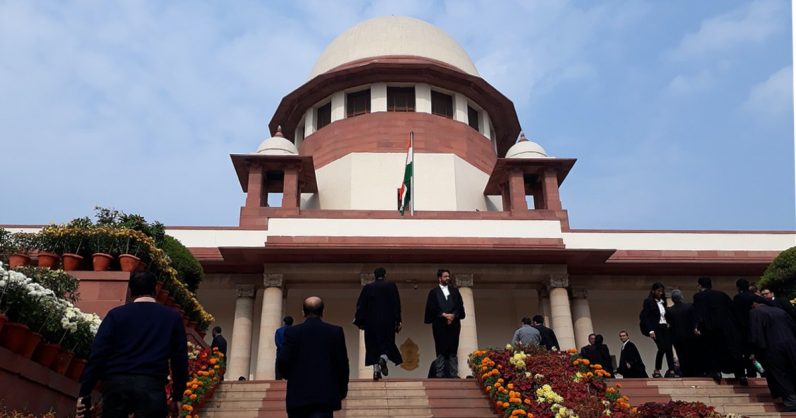The March MHA order avoids balancing employer-employee rights.
It should come as no surprise that we, as a people, have again turned to the Supreme Court of India to strike a balance between employers and employees without injection of capital from the state. At the heart of this problem lies our rather large population, lack of state funds and a persistent and knotty problem called Covid-19 that must be contained under our democratic traditions different from those of the state that spawned the pathogen. Unlike nations with relatively small numbers and higher budgets, India has other obvious spending priorities and we lack the machinery to administer and police fresh money-injection programmes, so transferring
In Ficus Pax Private Ltd. & Others vs. Union of India & Others, the Supreme Court delivered its interim order on 12 June 2020 in several dozen petitions challenging the 29 March MHA order (and its “relatives”), indicating in the Court’s own words the “equally adverse effect [of the lockdown] on the employer as well as on employees”. Dwelling on this point, the court considered arguments of both sides and opined that “lockdown measures which were enforced by the Government of India had serious consequences both on employers and employees… A balance has to be struck between these two competitive claims”. The court observed that “For smooth running of industries with the participation of the work force, it is essential that a via media be found out.” The court also noted that “It cannot be disputed that both Industry and Labourers need each other.” The order provides that “efforts should be made to sort out the differences and disputes between the workers and the employers regarding payment of wages of about 50 days and if any settlement or negotiation can be entered into between them without regard to the order dated 29.03.2020, the said steps may restore a congenial work atmosphere”. In essence, the Supreme Court has encouraged a process of negotiation between employees and employers to solve their problem bilaterally. This is how it should have been.
The Supreme Court will eventually decide the matter after receiving a more detailed and carefully considered response from the Union, but the order has continued interim protection afforded to employers earlier. The government has been permitted to file a detailed counter affidavit to support its arguments. At the heart of this case lies a legal problem which cannot be addressed by any other court except perhaps this one using its extraordinary and somewhat controversially wide powers under Article 142 of the Constitution—for doing complete justice and hence decide matters involving what should have been the domain of the executive. In this case, perhaps the executive should have considered a more even-handed approach, one that balanced the interests of employers and their employees. The order of 29 March misses the point about balancing interests and the Supreme Court has now been called upon to attempt that now, not for the first time. Employer-employee relationships are subject to a silo of laws called Labour & Employment laws. Beneficial statutory provisions provide for certain well-known benefits with a myriad of exceptions leaving the relationship to be essentially governed by agreement and hence the law of contract. Minimum standards are built-in by law, these include the employer’s right to lay-off workers if permitted by the statute or contract, systems of termination depending on the establishment and delineated rules requiring payment of wages subject to evolved principles including the no-work-no-pay concept that is mentioned in the Supreme Court order. The state, in the March MHA Order adopted an extreme approach, relied upon a statute that was not designed for employment relationships (the Disaster Management Act) and imposed obligations that could hardly be injected into the contractual relationship between two private parties, i.e., the employer and the employee. Some states even suffered the consequences of this order in respect of their own employees when revenues diminished. The 29 March order cannot become an implied term of the contract of employment, so an employee could only use it through another silo of laws i.e. criminal prosecution of the employer. The Supreme Court seems to have already discouraged such an approach by its interim order dated 4 June 2020, which has now been continued at least until a decision is taken in July—“no coercive action against the employers shall be taken pursuant to notification dated 29.03.2020”. Since this order has already been passed and is now continued, the Disaster Management Act, 2005 and the Epidemic Diseases Act, 1897, have been rendered ineffective for the time being. The Supreme Court will consider the issue in July and has encouraged the “parties” i.e. employers and employees to resolve the matter bilaterally. One cannot of course foretell the future, but the order pronounced by the court presently leaves the law undisturbed as it stood before 29 March 2020. For compliant and law-abiding employers, ones who paid employees in accordance with this order notwithstanding the lockdown, their advantage lies in employee goodwill, for the others a balancing solution may emerge simply resting upon our already existing plethora of employment laws. After that, more negotiations may take place to avoid the harsh punishment of years of litigation in the labour and civil courts where Covid-19 will always remain notorious.
Amir Singh Pasrich is Managing Partner of I.L.A. Pasrich & Company, Advocates. He is co-chair of the India Working Group of the International Bar Association (IBA) and is an elected member of the IBA’s LPD Council. He is also Chairman of the Law & Justice Committee of the PHD Chamber of Commerce.

